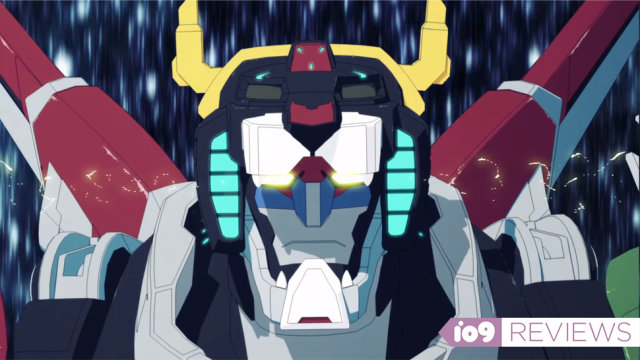Team Voltron is back, but everything has changed for the Paladins, and not for the better. But while the new season of Voltron: Legendary Defenders greatly expands the universe of the show, fans eager to see the crew find their footing after season two’s tragic cliffhanger might find these new episodes a little lacking.
Image: Dreamworks/Netflix

This is not to say that Legendary Defender‘s third season is of lesser quality than its predecessors. If anything, there are some absolutely landmark, top-notch episodes in the latest batch that represent some of the best work the show has done. The problem is the framing of the third season, which is just seven episodes long — down from the typical 13 — with six more episodes to come in a few months as “season four.” As a result, these seven episodes don’t end up feeling like a cohesive whole; instead, they feel exactly like half a season that wasn’t meant to be cut in half, but got cut in half. The split disrupts the storytelling flow for very little gain.
Thankfully, what storytelling is there lays some incredibly intriguing groundwork for what’s to come in Legendary Defender‘s future. The first half of the mini-season firmly establishes some big changes for the show’s cast. The first is on a macro scale, as the discovery of more rebel cells fighting back against the Galra Empire leads to team Voltron taking on a much bigger role as figureheads for the war to come against Zarkon’s forces. On a micro one, the team struggles to cope with Shiro’s disappearance at the end of season two. Aside from the personal nature of his absence enacting a heavy toll on the team’s spirits, Shiro’s disappearance also raises the logistical question of the someone to take his place and pilot the Black Lion so the team can form Voltron.
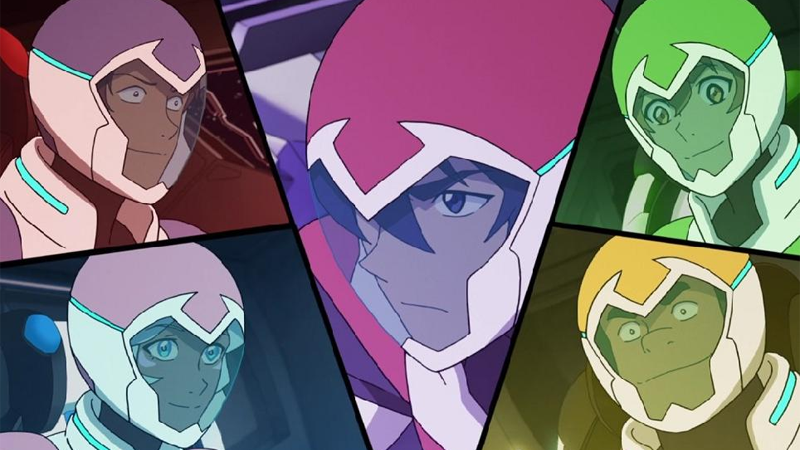
This leads to two important changes in the show’s cast: Keith takes Shiro’s place as the Black Lion’s pilot and the de facto leader of the group, a natural evolution of the arc he went on with Shiro in the second season. Allura finally takes her place as a Paladin, taking over the Blue Lion as Lance ascends to the Red, just like in the classic ’80s cartoon. While Keith and Lance’s “promotions” aren’t really dealt with as much (although Keith bristles at the idea he can no longer be a lone wolf, most of his acceptance of command was already solidified in his arc in season two), Allura gets to take the spotlight for an episode as she struggles to achieve something she’s wanted her whole life. Her bond with the Blue Lion doesn’t come as easily as she expected, and having to forge it during a particularly tense engagement with the season’s new villain (more on him in a bit) puts her through a wringer that ultimately pushes the character in an interesting new direction, despite this being a move classic Voltron fans have been expecting for a while.
The change-up gives the show a fresh dynamic, one that creates new trials for a team that had pretty solidly gotten its stuff together by the end of season two. Even when Shiro makes a puzzling return midway through the season — although there’s enough hints and clues that it might not be the Shiro we know and love, something that will presumably be dealt with in the next batch of episodes as there are no real answers about his disappearance here — the heroes still feel like they have been pushed into a new direction with plenty of opportunities for intriguing stories going forward.
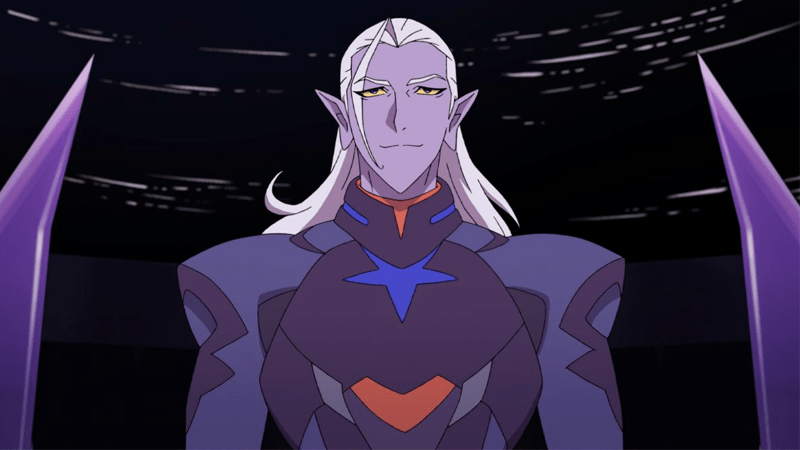
It’s not just the Paladins who undergo a status quo change in season three, either. The Galra empire gets a much-needed shakeup in the form of its new leader, Zarkon’s Altean/Galra half-breed son, Lotor. The villains have been one of the weakest parts of Legendary Defender so far, and Lotor thankfully rectifies this by acting as a much stronger mirror to the Paladins than Zarkon and Haggar ever were. Not only is he a much more active participant in the story compared to Zarkon, Lotor represents something different: an antagonist who thinks and uses strategy as opposed to the brute force his father preferred. Lotor’s whole deal is that he believes loyalty is more likely to keep the ailing Galra empire together rather than ruling through fear, engendering favour with the species they rule over to ensure co-operation — a much more morally complex and intriguing angle to the Galra than them being bad guys for the sake of the show needing bad guys.
That idea of loyalty is represented through Lotor getting his own small retinue of generals to work alongside. Although they’re not as fully fleshed out as Lotor is (yet), giving the Paladins a mirror group of enemy “pilots” to go up against — one that appears unified and almost unstoppable in the wake of Team Voltron’s discord from Shiro’s loss and Keith’s rough start as the new team leader — creates another interesting new dynamic for the show. Even better, it also hints at some discontent between Lotor and his father near the end of the season, another intriguing conflict to be explored later.
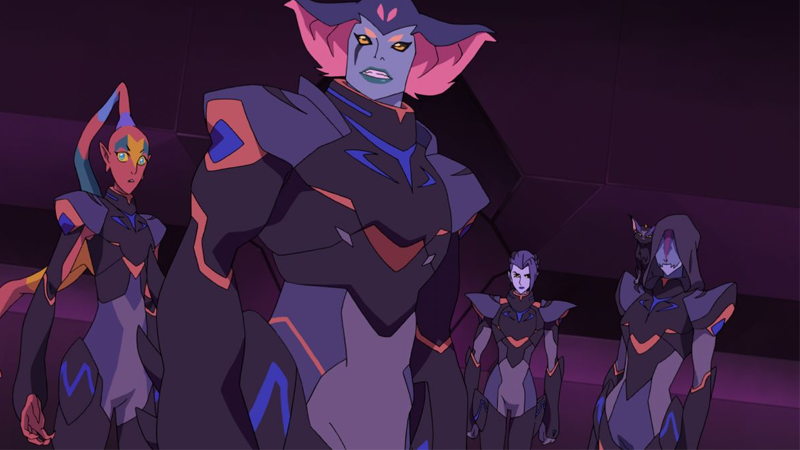
But Legendary Defender‘s third season is more than just shaking things up. Two episodes in particular this season really begin to delve into the backstory of the series that paints a much bigger and richer story beyond the conflict between the Paladins and the Galra empire. One of these is less clunkily handled than the other, but both help to flesh out the universe in some major, tangible ways that provide some crucial storytelling hooks for the show going forward. The best of the two is a surprising, delightful alternate universe episode that not only delves into Voltron’s origins and a “what if” scenario that imagines the fate of the Alteans and the Galra being subverted, but also includes one of the best, goofiest in-jokes the show’s ever done (and is so good I can’t spoil it here).
The clunkier episode is actually the season’s “finale,” a story almost entirely set in the past that finally uncovers the history between Zarkon, Allura’s father King Alfor, and the creation of the Lions. Once again, if anything it’s the constraints of this half-season that make the episode feel clumsy rather than the actual material of it. While its revelations include groundbreaking information about the Voltron universe fans have only been able to really speculate about for the past few years — information that also crucially gives Zarkon and Haggar some depth and personality that’s largely been absent up until now — it’s still primarily a flashback-driven infodump, and it doesn’t feel right as a season finale. It’s an awkward end for the mini-season, and it doesn’t sit right as a finale.
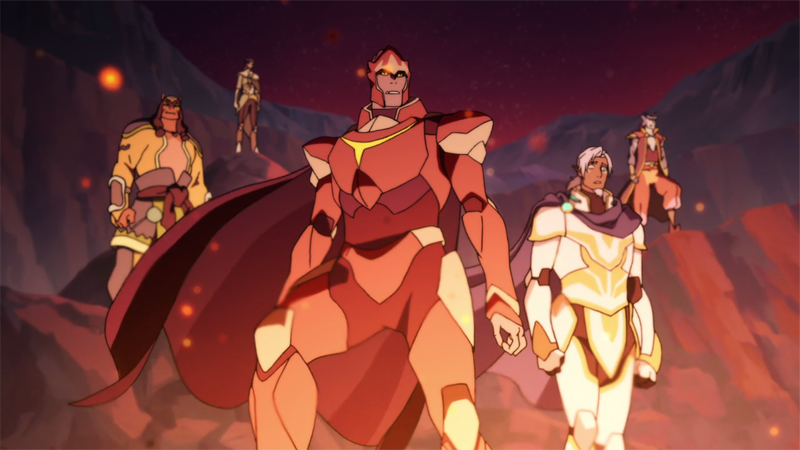
It’s emblematic of Voltron: Legendary Defender‘s third season as a whole. These seven episodes are the show at its biggest and best, giving fans a whole new status quo — both for the Paladins and the villains — while also expanding the scope of the series’ universe, with important backstory that serves to enrich the universe the titular robot legendarily defends. And yet, its truncated nature leaves an itch at the end of season two — specifically surrounding the ongoing mystery that is Shiro — that remains unscratched.
If shorter seasons are going to become the norm for Legendary Defender, they need to flow better than season three does, which feels robbed of the crucial context the next six episodes will undoubtedly provide when it arrives as season four in October. Given how great season three was, though, I honestly wouldn’t have minded waiting to see the whole thing in one go.
